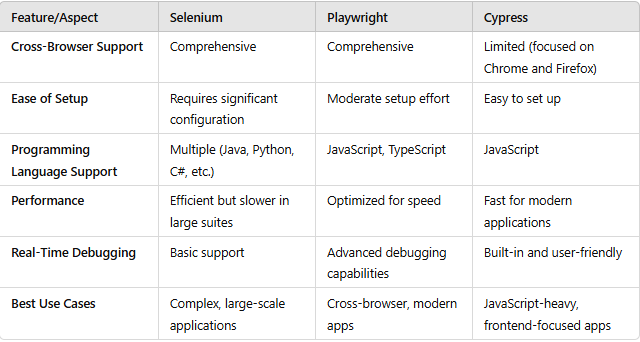Selenium vs. Other Automation Tools A Comparative Analysis
As automation testing evolves, the choice of tools becomes a crucial decision for organizations aiming to deliver high-quality software efficiently. Selenium has been a cornerstone of test automation for years, but other tools like Playwright and Cypress are gaining popularity, offering unique advantages. This article provides a comparative analysis of Selenium and other leading automation tools, helping businesses and Automation Testing Companies make informed decisions.
Overview of Selenium
Selenium is an open-source framework widely used for automating web application testing. It supports multiple programming languages, browsers, and platforms, making it a versatile choice for diverse testing needs.
Key Features of Selenium:
- Cross-browser and cross-platform compatibility.
- Integration with popular CI/CD tools.
- Extensive community support and documentation.
- A robust suite of tools, including Selenium WebDriver, Selenium IDE, and Selenium Grid.
Selenium Automation Companies leverage these features to provide scalable and efficient testing solutions for web applications.
The Contenders: Playwright and Cypress
While Selenium has been the go-to tool for years, Playwright Testing Tool and Cypress Automation Tool are making significant strides in the automation landscape.
Playwright
Playwright, developed by Microsoft, is a relatively new tool designed for modern web applications. It focuses on delivering reliable cross-browser testing with advanced features like auto-waiting and seamless debugging.
Cypress
Cypress is a developer-centric testing tool designed for end-to-end testing. It is known for its speed, simplicity, and ability to test JavaScript-heavy applications effectively.
Comparative Analysis

Why Selenium Remains a Popular Choice
Selenium is still favored by many Automation Testing Companies for the following reasons:
- Versatility: Selenium supports multiple browsers, platforms, and languages, making it adaptable to diverse testing environments.
- Community Support: With its long-standing presence, Selenium boasts an extensive community for support and knowledge sharing.
- Integration: Selenium easily integrates with other tools like TestNG, JUnit, and Jenkins, enabling seamless testing pipelines.
- Scalability: Using Selenium Grid, organizations can scale their test automation efforts across distributed environments.
These features make Selenium a staple for Selenium Testing Services offered by Selenium Automation Companies.
Strengths of Playwright and Cypress
Playwright
- Ideal for applications requiring extensive cross-browser testing.
- Built-in features like auto-waiting reduce the need for manual scripting.
- Offers reliable testing for dynamic content and modern web applications.
Cypress
- Focused on simplicity and developer experience, making it accessible for teams with limited automation expertise.
- Excellent for testing Single Page Applications (SPAs) and other JavaScript-heavy apps.
- Real-time reloading and debugging features streamline the testing process.
Choosing the Right Tool for Your Needs
The decision between Selenium, Playwright, and Cypress depends on your project’s specific requirements and the expertise of your team. Here’s a quick guide:
- For Broad Compatibility and Scalability:
- Choose Selenium for large-scale projects requiring extensive browser and language support.
- Recommended for Selenium Automation Testing Company services.
2. For Modern Web Applications:
- Use Playwright for dynamic, cross-browser testing.
3. For Developer-Friendly Testing:
- Opt for Cypress for faster setup and execution, especially for frontend-heavy applications.
Conclusion
Automation tools like Selenium, Playwright, and Cypress each bring unique strengths to the table. While Selenium remains a cornerstone for many Selenium Automation Companies due to its versatility and scalability, tools like Playwright and Cypress are gaining traction for their specialized features.
Partnering with an experienced Automation Testing Company ensures that you choose the right tool for your testing needs, optimizing your processes and delivering high-quality software. Whether you’re scaling existing Selenium Testing Services or exploring modern tools like Cypress and Playwright, the key lies in aligning your toolset with your project goals.
If you have any questions or feedback, feel free to contact support@automationqa.co.



Comments
Post a Comment